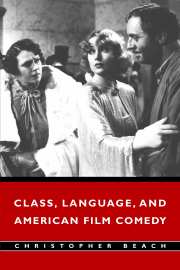Book contents
- Frontmatter
- Contents
- Acknowledgments
- Introduction
- 1 A Troubled Paradise: Utopia and Transgression in Comedies of the Early 1930s
- 2 Working Ladies and Forgotten Men: Class Divisions in Romantic Comedy, 1934–1937
- 3 “The Split-Pea Soup and the Succotash”: Frank Capra's 1930s Comedies and the Subject of Class
- 4 Is Class Necessary?: Preston Sturges and Howard Hawks in the Early 1940s
- 5 Desperately Seeking Status: Class, Gender, and Social Anxiety in Postwar Hollywood Comedy
- 6 Is There a Class in This Text?: Woody Allen and Postmodern Comedy
- 7 Yuppies and Other Strangers: Class Satire and Cultural Clash in Contemporary Film Comedy
- Notes
- Works Cited
- Index
Introduction
Published online by Cambridge University Press: 02 December 2009
- Frontmatter
- Contents
- Acknowledgments
- Introduction
- 1 A Troubled Paradise: Utopia and Transgression in Comedies of the Early 1930s
- 2 Working Ladies and Forgotten Men: Class Divisions in Romantic Comedy, 1934–1937
- 3 “The Split-Pea Soup and the Succotash”: Frank Capra's 1930s Comedies and the Subject of Class
- 4 Is Class Necessary?: Preston Sturges and Howard Hawks in the Early 1940s
- 5 Desperately Seeking Status: Class, Gender, and Social Anxiety in Postwar Hollywood Comedy
- 6 Is There a Class in This Text?: Woody Allen and Postmodern Comedy
- 7 Yuppies and Other Strangers: Class Satire and Cultural Clash in Contemporary Film Comedy
- Notes
- Works Cited
- Index
Summary
Of all the genres of Hollywood film that underwent the transition from silent to sound production in the late 1920s and early 1930s, it was the comedy, along with the musical, that most obviously benefited from the arrival of the “talkies.” Screen comedies of the silent era – though they had included sophisticated social comedies by directors such as Cecil B. DeMille and Ernst Lubitsch – had been dominated by the physical, slapstick, or clown comedy popularized by such actors as Charlie Chaplin, Buster Keaton, Harold Lloyd, and Harry Langdon. The sound era brought to the fore an essentially new genre of dialogue-based romantic comedy, a genre that foregrounded both the art of spoken language and the nuances of class-based relationships.
In silent comedy, class divisions tended to be depicted in terms of crude dichotomies. The characters created by comedians like Chaplin, Mack Sennett, Mabel Normand, and the Keystone Kops represented working-class types and situations that were immediately familiar to their audiences and that would allow the filmmakers to parody conventional middle-class standards of behavior. In Chaplin's films, for example, the tramp figure stands as a universally recognizable icon of lower-class status rather than as a fully delineated social individual. The tramp was already well established as a stock figure in American popular culture, from music hall and vaudeville to pulp literature, newspapers, comic strips, and nickelodeon pictures. Chaplin's tramp, as a particularized variant of the familiar character type, remains a constant throughout his films, prompting some critics to question the social relevance of the tramp figure or even its basis in real life.
- Type
- Chapter
- Information
- Class, Language, and American Film Comedy , pp. 1 - 16Publisher: Cambridge University PressPrint publication year: 2002



